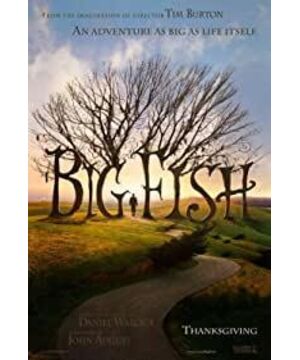Tim Burdon's movie "Big Fish" is so much loved by the audience. Just a few words can sum up its essence: a father always tells others about his past almost mythical legends Through the experience, the son has been fascinated by him since he was a child, and he was convinced, but when he became an adult, he thought it was all absurd bragging. Before his father died, the son finally discovered that his father’s "myth" was the best portrayal of his life. The title of the film has been translated into Chinese into "Big Wisdom as a Fish", which has the meaning of plausing the wisdom of the fathers, and the film will thus be understood as a metaphor for social intergenerational communication. However, I think a slightly wordy translation is more appropriate to highlight the theme of the film: Zifeiyu, the joy of knowing the fish? ——You don't believe the story I told, how can you understand the beauty of it? "Big Fish" compares two different media-oral culture and printing culture in the way of stories. The father once said to his son on the sick bed: "Our father is both storytellers (story teller)". His son smiled condescendingly at this newspaper. He is a reporter for a major news agency based in Paris. In his opinion, the two are essentially and hierarchically different. Although in English, report and story are the same word. (Story), but how can his father’s verbal stories full of loopholes, inconsistent, mysterious and bizarre, be compared with the international communications he published and printed in serious newspapers? The story of his son bears the typical characteristics of the print medium: the use of a printing press Achieved high-intensity repetitive copying, low-resolution concise style, and a single identification of facts. In contrast, the father’s story is completely colloquial, messy, random, divergent, rich in details, but with bad logic. And father The younger daughter-in-law was very uncomfortable with the insertions, flashbacks and supplementary narratives in the father-in-law’s spoken stories at first. His father enlightened him: “Don’t you know, this is the storytelling. What’s the taste of flat narration? "If the same technique is used too much, the story structure of the printed text will tend to collapse, while the spoken story has nothing to do with it due to the use of the characteristics of time. The spoken story is more like music unfolding in time, and it plays with it." The unrepeatable feature of the “flow of time” (“you cannot step into the same river twice”) is at the two extremes of the exact reproduction and repeatability of printed media. Of course, oral stories can also be printed on paper. But it loses its most subtle part-improvisation and non-repeatability, just like when music is recorded into a record, it is only a copy of the music, a fixed shadow, rather than the music itself. The temporality of the spoken language medium The characteristics make the so-called "facts" present an elusive side in spoken stories. In other words, this is not what the spoken stories are most concerned about. The meanings in the spoken stories are layered, changeable, and even conflict with each other in the flow of time. It is the son who is surrounded by the print media that is most unacceptable and understandable. He believes that everything his father said is a delusion of arrogance, without reflecting on his single understanding of whether facts are true or false, which prevents him from intervening in his father. The world. Each medium stipulates the nature of its own message, which is called "the spell of the medium" by McLuhan. In "Big Fish", the estrangement between the son and the father is caused by the respective spells of the two media. Confusion and conflict are achieved by the printing media through the function of copying. The group consensus and the unitary understanding of facts achieved by the print media have strengthened the barriers of writing in European countries. It was once considered to be one of the important factors that gave birth to the trend of nation-states. Today’s modernization has lost its appeal. The Internet is more and more deeply embedded in the society. Under the condition of deep involvement in one-to-one, the oral story of the father can easily defeat the printed story of the son. In the film, as a photographer The reporter's daughter-in-law soon surrendered to the oral curse of her father-in-law, which may prove from the side that images are more suitable for this era of internet and image reading than printed text. Of course, the most exciting part of the whole "Big Fish" story is its ending-the death and resurrection of his father. The sprout of the spoken language that the father planted in his son’s childhood finally broke ground when he was about to die. The son told the most exciting story in his father’s life: the son carried his father through the traffic jam on the road (born by wheels). The two-way road also has the characteristics of either-or in the printing medium. Breaking this single order seems to mean that the son is liberated from the curse of the printing medium.) When he comes to the river, his father turns into a big fish and plunges into the source of living water. The river of time, a spoken world where meaning can travel. The brilliance of "Big Fish" lies in the use of an extremely accurate image to capture the characteristics of the spoken language. Compared with the one-way mode of roads and wheels, what can bring a sense of freedom and direction more than fish and water. ? Flying and the sky may be comparable, but they are light and unobstructed. Water, mysterious and translucent, reflects the elusiveness and uncertainty of this world. The question we have to face is, do you believe this story? But believe me, the answer is not one or the other.
View more about Big Fish reviews











